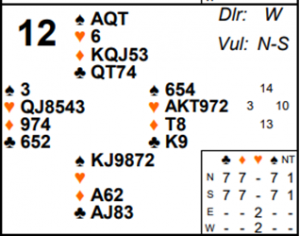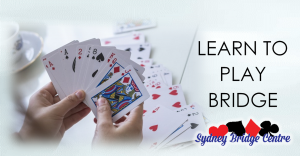City and Canada Bay – Monday Morning 23rd September 2024.

Board 12 last week saw an enormous 12 card heart fit for East West and a possible slam for North South. A large proportion of the field played in 4♠, however. Could they have done better?
West might well open a weak 2♥. The hand has a huge number of losers but the vulnerability is favourable and these days more aggressive pre-empts are very common (and frequently very effective).
Over 2♥ North is best starting with a double. Yes he only has 3 spades but the rest of the hand is ideal with support for the other suits. A 3♦ overcall doesn’t describe the hand nearly as well. East will probably still be picking himself up from the floor after hearing his partner open 2♥(!) but then needs to decide what to do. What’s more he should plan ahead as well. Clearly a simple option is to jump to 4♥ but East’s real problem is likely to come after that. It’s extremely likely to go 4♠ P P back to him and now he has to decide how much higher in hearts to go? Surely 5♥x will be cheap but on the other hand it must be likely from his point of view that the opponents can make slam. Does he want to give them another chance to reach it or should he be satisfied and just leave them in 4♠?
There are all sorts of possible approaches East could take here – a simple jump raise of course takes a lot of space away and is often, in practice, still the best. Indeed, another option might be to jump immediately to 5♥ to take the most space away – and then sell out to 5♠. But he could also attempt to conceal just how big a heart fit there is and start with a gentle 3♥. The idea is that when the opponents bid to 4♠, he can now bid 5♥ and hope to attract a double. This is also a common position perhaps to throw in a psyche! See advanced section for more. There is lot of bluff and double-bluff involved in these sorts of hands! If East knows his opponents and their tendencies that can of course make it easier. If they are aggressive slam bidders, for example, he may be more likely to want to sell out to 4♠ and not give them a second chance.
What about South? He has an enormous hand with a lot of first round controls and when partner makes a takeout double of 2♥ he should immediately be thinking about slam. What I suspect happened at a lot of tables was the auction 2♥ x 4♥ 4♠ all pass. But South is far too good to just bid 4♠ here. Think of all the much weaker hands you could hold that would also bid 4♠. Here South has 6 trumps, a void in the opponents’ suit and 1st round control in the other two side suits – both of which partner has implied with his takeout double. He really doesn’t need that much from North for slam to be good. There’s actually quite a good case for South to simply jump to 6♠! Another possibility is to bid 5♥ over 4♥ – which at that stage is just showing a really strong hand. North will probably bid 6♦ over that (not yet knowing about spade support) and now South could bid 6♠. It’s not easy to construct a good auction to a grand slam with that level of pre-empting going on but either partner might consider it.
If East West were playing a multi the auction will start much more slowly. West opens 2♦ and East of course will assume he has a weak 2 in spades! North might double and East should bid 2♠ (pass or correct – if West has spades that’s as far as he wants to go but the sky is the limit if he does have hearts!) That can make things messy for South. But he can afford to just double – he knows West has hearts 99% of the time (unless spades are 6610 round the table!). If North instead bids 3♦ over 2♦ then East will pass (again assuming partner has spades) and now South can bid 3♠ forcing. It’s a good example of why the multi isn’t as effective as a natural weak two – East doesn’t immediately know about the huge fit so cannot afford to pre-empt. Therefore North South can start their bidding at a lower level and now have a much greater chance of reaching slam.
What about the play? In spades there’s basically nothing to it. Declarer can ruff the almost certain heart lead, draw trumps and run 5 rounds of diamonds discarding two of his clubs. That still leaves him with ♣AJ and he can safely take the finesse which works for an overtrick. Most pairs therefore scored +710 on the hand. One or two seem not to have taken the finesse as they only made 12 tricks – but there’s no risk in it at all. One or two pairs also played in diamonds (perhaps North overcalled 3♦ here?) At matchpoints that’s disastrous of course since it only scores 640 (although if you do find a grand slam 7♦ is a better contract than 7♠ – see advanced section for why).
Finally, if South does bid 6♠ then East still has a decision to make – should he attempt to sacrifice in 7♥?! It may still be worth it – it will almost certainly go for a penalty less than the value of the opponents’ slam (even 6 off for a penalty of 1400 is better than -1430 or -1460!) But that’s not the only thing East should consider – see advanced section for more.
Key points to note
- When you know of a huge fit for partner there are lots of ways of bidding – a heavy pre-emptive jump will often work best but you might also take it slower to try and conceal what’s going on to encourage the opponents to double you instead of bidding on.
- After partner makes a takeout double and RHO bids a new suit, it’s a good idea to play double as showing that suit (it exposes RHO trying to be clever with a psyche!)
- Always think about what you could hold for a bid you are considering. If you would make the same bid with a much weaker hand then you should probably be doing something different (perhaps a cue bid of the opponents’ suit) with a stronger hand.
- Don’t sacrifice at pairs unless the penalty is likely to be lower than the opponents’ game. Sacrifices at the slam level are rarely worthwhile (even if they have slam on usually a lot of the field don’t bid it).
- Ruffing in the short trump hand is worth an extra trick relative to ruffing in the long trump hand – sometimes on hands with a double fit that can influence which suit will be better as trumps.
More advanced
What might East try after 2♥ x ? The favourable vulnerability and the known enormous heart fit gives rise to all sorts of “fun” possibilities since East can always safely retreat to hearts if doubled. What if East tries an innocent looking 2♠?! South will be very suspicious but the pair still need bidding methods to overcome this sort of thing. A common approach by experienced pairs here is to play double by South as showing the suit bid – effectively exposing the psyche. That’s common at the 1 level as well (e.g. 1♣ x 1♠ x showing spades). Bidding spades by South should also be natural – again effectively ignoring East’s bid.
It should be remembered that psyching is a controversial topic – some people get extremely upset and believe the practice should be barred. It’s a perfectly legitimate thing to do – but the key is partner must not deliberately assume it is a psyche – the fake bid should fool all 3 of the other players equally. Amongst experienced players in a position like this it would be quite rare NOT to psyche! But it is not a fair or reasonable thing to do against novice players. It will probably work yes – but do you want to put them off bridge for life if they get fooled out of a slam by what, at this stage of their bridge careers, they will think of as cheating? Is it worth it? No – you will probably beat them by bidding and playing better than they do anyway so there is no need to try and be clever.
I said 7♦ was a better contract than 7♠. Why? Suppose the ♣K was with West and not East (quite plausible with a weak 2♥ opening). Playing in spades we saw that 2 clubs can be discarded on North’s diamonds but the club finesse is still required. But playing in diamonds that’s no longer the case. North’s heart can be ruffed in South (not that North would have been expecting that during the auction!), then after drawing trumps, South’s spade suit provides discards for 3 of North’s clubs. The hand is a good example of how ruffing in the short trump hand gains a trick. Playing in diamonds the heart loser is being ruffed in the short trump hand – but with spades as trumps it’s being ruffed with one of the long spades that are tricks anyway.
So what about a 7♥ sacrifice from East? Two problems with it:
- There is a genuine risk North South might now bid 7♠ anyway (assuming West’s weak 2♥ shows 6 East knows one of them has a void so could make a try for grand).
- It is still likely to score badly. Remember when playing pairs you have to consider the whole field. A sacrifice at pairs needs 3 conditions in place to score well:
a) The opponents’ contract has to be making
b) The penalty has to be less than the value of that contract
c) A large proportion of the field has to be bidding the contract
Here the 3rd condition fails. The penalty in 7♥ turns out to be 1100 (losing 1 spade, 2 clubs and 2 diamonds). If the North South field was all bidding 6♠ and scoring +1460 then that would be great. But they aren’t! They are scoring +710. So it comes down to a judgement about how many pairs you think will bid slam the other way. You might argue that -1100 is still better than -1460. Yes it is – but it won’t make many matchpoints difference. Your better chance is to hope their slam goes off – which would now give you a huge top. In practice most fields (especially at club level bridge) are very bad at bidding slams. So you should only sacrifice if you think your contract might go for a penalty less than the value of their GAME. A couple of lucky pairs here were allowed to play 5♥x for -500. That’s fine and of course scored really well – but once the penalty becomes 800 or more it’s not worth it in practice.
Julian Foster (many times NSW representative) ♣♦♥♠



